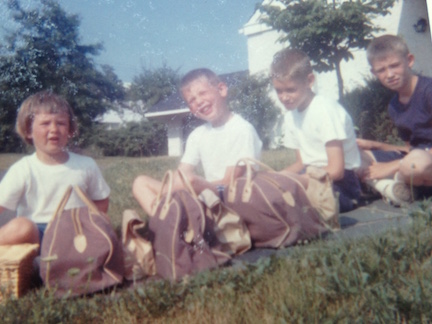Chris with John, Steve, and Bob, ready for day camp, Southhampton, Pennsylvania. Photo by Gloria Woodside
Appalachia Journal, Winter Spring 2016

I first climbed the Ramsey Trail in central New Hampshire with my three big brothers—Bob, Steve, and John—in the mid-1960s, when my family vacationed at a camp on Squam Lake. I followed the boys up this trail that took the direct route up the small but formidable 1,260-foot rock face of Rattlesnake Mountain. The boys could reach the top in fifteen minutes going on the Ramsey, and I tried to go as fast as they did but never succeeded.
Last June, I stepped back onto the trail that the reckless Ramsey of long ago had blazed. Now I hesitated. The boulder-strewn trail would require more time than I had. I hadn’t been here in so long. Midday sun glittered on the mica bits in the dry soil. Roots hunched up beside the old rocks. The vegetation seemed so familiar, and yet the trees had grown giant and the path more trampled.
I’d been climbing mountains for so many years that I was shocked to find myself back in childhood. I actually heard my brothers’ voices. Steve, five years older than me, was saying, “Chrissie, we’re not going to wait.” John, my closest brother, was scrambling his way up, baggy jeans hanging, calling, “Chrissie, come on.” Bob, six years older, was quietly surging forward. (And I remembered a time on the Ramsey when Bob was in his late 20s, a microchip engineer. We’d taken the wrong fork near the bottom—a fork that always confused us—and had to about-face. “We’ve lost seven minutes!”)
Climbs spanning my entire life came together as one strong uncomfortable realization as I pushed up the face, looking nervously at my own watch because some people were going to be waiting for me down below. I realized that I’d learned to scale mountains through a kind of tough tiger-brother training. None of my brothers ever waited for me. My brothers never asked me how I was feeling or whether it might be too hard for me. If I complained about their bombastic indifference, my parents would say, “They give you a hard time because they like you.”
Panting, I lunged toward the steepest part after briefly going the wrong way. That was it! I’d dreaded mountains when I was a kid, but they always exerted this amazing force, and I went up, over and over. Many years later, with my new husband hiking long distances with a full pack, I knew something. I knew in muscle memory that pain is not a bad thing. When you climb to the top of even a very small mountain, by the hardest route possible, you know that you can do more hard things. This is the epitome of developing resilience.
Steve later told me that he believed nobody could keep up with him and John on the Ramsey Trail. “One particular time,” he said, “Dad got the big idea that the men, and you, would all climb up Ramsey together.” He recalled that I had caused some kind of commotion because I thought a bee had stung me. “You slowed down, then stopped, and began whining about it. Dad (and I think Bob) stayed behind to attend to you, and John and I finished off the trail alone at our usual pace. Inwardly, I was a little annoyed we had to deal with you— no bee sting was ever verified— but it all worked out in the end.” I remember nothing of the bee sting story, and I note the happy oddness of Steve’s saying that “it all worked out in the end.” When I was a kid, I was never sure, running behind them, whether it all was working out at all.
John reminded me, when I asked him, about going up with our father, “the great trail finder” (which he wasn’t, being from cities originally, and part of this dynamic was him laughing at himself and our learning to follow trails so he wouldn’t get lost). “In true form,” John said, “we lost the trail about halfway up. Then we just bushwhacked. Somehow we eventually found our way to the top. I remember you were not too happy about losing the trail, but you soldiered on and got it done.”
I remember that particular day well, but not that either my father, John, or I felt worried for one minute. I trusted them by then. I guess it was just part of the family business, to scramble up Rattlesnake at every opportunity during our two short weeks.
Now, back after so many years, I instinctively hurried—muscle memory, instinct to run behind the boys. All of my brothers were athletes. They did not consider any other method of climbing. I could match their pace or I could hang back. My choice. My brothers sometimes intimidated me, but they radiated pure joy on Rattlesnake.
I took a quick look at the sparkling water of the lake far below. Then I hurried down, crab-walking and jumping from rock to root, shocked at how strong the boys’ presence felt. And I realized why. For all the times I’d climbed Rattlesnake—by the Col and Ridge trails, by the Pasture Trail, by the Old Bridle Path, and by this crazy Ramsey Trail—this moment marked only the second time I had been on the Ramsey by myself. The first time, I’d gotten lost and ended up, 25 minutes later, in a meadow.
The boys are the reason I climbed mountains, and yet when I got serious about it—that year I’ve written about here before, when my husband, two friends, and I set out to thru-hike the Appalachian Trail—I later learned that two of my brothers had all doubted I would make it. (John did not doubt.) But each of them came out to meet us on the trail. Steve and his wife waited for us at Pine Grove Furnace State Park. John and his wife hiked with us into Palmerton, Pennsylvania. Bob waited at a trailhead in Vermont overnight and then packed in two cans of baked beans.
Not one word from them about “we never thought you’d get this far.” Instead, my brothers all showed by their actions that they cared, just the way they’d done so when they allowed me to follow them so long ago.
About This Article
This is my column, “The Long Way Home,” from the Winter/Spring 2016 issue of Appalachia journal.
.
